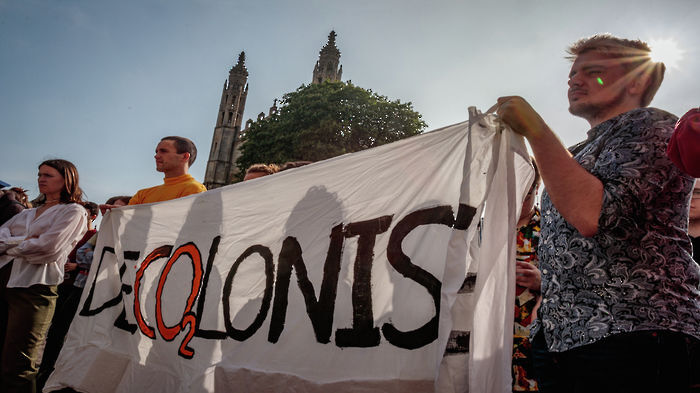Making sense of climate change in what lies ahead
We must challenge the view that our environmental future is doomed, explains columnist Sam Warren-Miell

There is a certain strain of ecologism that operates as a kind of barely-secularized eschatology. According to this vision, climate change is the approaching apocalypse, the actualization of the plagues of fire, smoke and brimstone, an unimaginable catastrophe-to-come in which the predatory excesses of us sinful humans will be duly punished in the armageddon. This ideology misses the fact that, not only has climate change been caused and exacerbated by a comparatively very small number of people - businessmen, industrialists and politicians - but it is these same people who will be spared its worst consequences. The reality of climate change will not be the Day of Universal Judgment, but an intensifying state of emergency, over many decades, by which the capitalist class will absent itself from the consequences of its own destructive activities: the migrant crisis, the food shortages, the natural disasters, many of which are already occurring.
In short, ecology is always in danger of devolving into a pious conservatism according to which a fallen and essentially doomed humanity has lost its relationship with universal Nature. At its worst, this ideology advocates the primitivist return to an originary (and always fictional) harmony between individual humans and a nourishing, maternal world. It is true that in the shining techno-futurism of the early twentieth century we now see only the promise of manmade annihilation, but the danger comes when this is taken to license the conclusion that man’s capacity for creation and reinvention is aligned entirely with the nihilism of the contemporary world; that because every historical leap forward has been a leap towards the disaster in which we find ourselves, it must now be time to leap backwards.
The reality of climate change will not be the Day of Universal Judgment, but an intensifying state of emergency
It is a question of the relationship between nature and history. Since its inception, philosophy has entertained a strong relationship to this question: from the Greek debate concerning the opposition physis/nomos (nature versus law and order) to Descartes’ designation of man as the master of nature. The history of this question is one of the very separation of history from nature, and therefore of humanity from naturality. Ecology interrupts this history by situating mankind within a nature which must be conserved in its universal continuity. The real problem, then, is how to organise a non-reactionary ecological vision of history, a vision that does not end in the rejection of history in favour of a fabricated (and all too human) natural totality, in the replacement of the future with a re-animated and transcendent past.
The solution, for me and for groups like the Zero Carbon Society here at Cambridge, is to locate ecology within a politics that extends beyond the purely ecological. From the recognition that the thought of the future cannot start from the derogation of the future, and that our catastrophe cannot be addressed without the means of the modern world, we affirm that the refusal to separate history from nature cannot consist in the subordination of history to an idealized nature.
The solution is to locate ecology within a politics that extends beyond the purely ecological
Politics is, for me, essentially affirmative. This means that it starts with the creation of something new, outside of the accepted organisation of the world, not from the negation of what is the case. This creation is not of the order of the destructive innovations which ecology is right to condemn. Rather, it means that one affirms the possibility of real creativity and of the genuinely new: not new in the sense of new products to buy, new policies to disenfranchise the poor, new methods to extract oil; but new in the sense of new political forms that organise democracy in the reality of practice, new associations between hitherto disjoined elements of the social body, and new sites of association, education and thought.
What this means is that we do not give ground to the contemporary ideology that primitivist ecology unwittingly endorses by making change and novelty in themselves synonymous with the hollow law of change that animates capitalism. It means rejecting what Bifo Berardi, an Italian Marxist theorist, characterised as ‘the slow cancellation of the future’: a pure nihilism which for us is manifested in something like continued investment in fossil fuel companies. It means reconceiving the future not as the unfolding of destruction but rather as the scene within which which politics, acting in its own name, can think ecology concretely and practically, without any veneer of sanctification. It is a future that, for us, starts here at the university. It is a future that is, in the words of Mallarmé, ‘over there, wherever it is, denying the ineffable, which lies.’
 News / Colleges charge different rents for the same Castle Street accommodation2 March 2026
News / Colleges charge different rents for the same Castle Street accommodation2 March 2026 News / King’s hosts open iftar for Ramadan3 March 2026
News / King’s hosts open iftar for Ramadan3 March 2026 Theatre / Lunatics and leisure centres 4 March 2026
Theatre / Lunatics and leisure centres 4 March 2026 News / Angela Merkel among Cambridge honorary degree nominees27 February 2026
News / Angela Merkel among Cambridge honorary degree nominees27 February 2026 News / News in Brief: waterworks, wine woes, and workplace wins 1 March 2026
News / News in Brief: waterworks, wine woes, and workplace wins 1 March 2026








